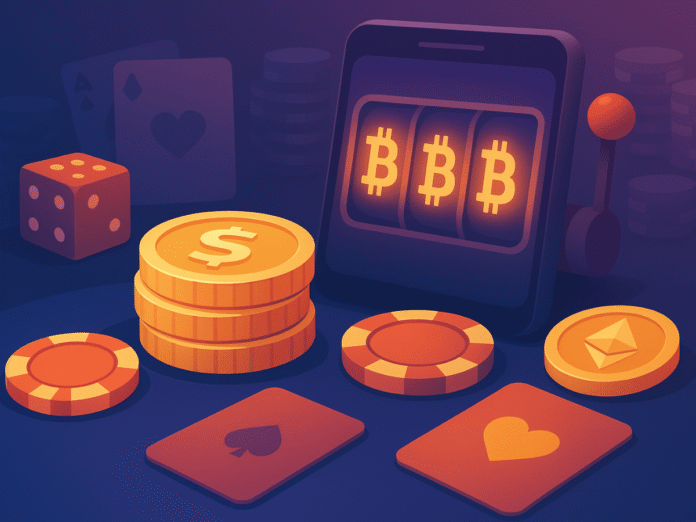For years, the conversation around crypto in gambling has been a simple one: “Should we accept crypto or not?” That debate is finally fading into the background. In 2025, the real question isn’t whether to embrace digital currencies—it’s which ones, and how to use them in ways that actually enhance the gaming experience.
Welcome to the era of stablecoins and tokenized rewards, where innovation meets practicality and crypto’s role in gambling matures from a novelty into an integral part of the ecosystem.
From Hype to Habit: The Evolution of Crypto in Gambling
In the mid-2010s, Bitcoin’s entry into online casinos sparked curiosity and chaos in equal measure. It offered anonymity, low fees, and cross-border accessibility—an exciting cocktail for players and operators alike. But as regulators tightened their grip and Bitcoin’s volatility swung wildly, the enthusiasm began to wane.
Fast forward to 2025, and we’ve arrived at a much more mature point in the conversation. The gambling industry no longer sees crypto as a rebellion against the financial system—it sees it as an upgrade to that system. The narrative has evolved from “crypto yes or no?” to “which digital assets actually make sense for gaming?”
That’s where stablecoins and tokenized loyalty systems come in.
The Rise of Stablecoins: Practical Crypto for a Volatile Industry
Bitcoin may have blazed the trail, but stablecoins are paving the road. For online casinos, sportsbooks, and gaming platforms, stablecoins solve one of crypto’s biggest headaches: volatility.
Imagine a player wins $5,000 on Tuesday, but by Wednesday the value of Bitcoin drops 10%. That’s not just frustrating—it’s unacceptable for a mainstream audience. Stablecoins like USDC, USDT, DAI, and even EURC (for European players) offer what Bitcoin cannot: the benefits of blockchain transactions without the price rollercoaster.
Why Stablecoins Work So Well in Gambling
- Predictable Value:
A stablecoin pegged to the dollar, euro, or pound means your winnings today are worth the same tomorrow. That stability builds trust and simplifies accounting for both players and operators.
- Instant Settlement:
Blockchain rails process transactions within seconds, cutting out the lag and fees associated with traditional payment systems. Withdrawals that once took days now take minutes.
- Cross-Border Flexibility:
Stablecoins aren’t bound by national payment networks. A player in Brazil can send USDC to a casino in Malta just as easily as someone in London can, bypassing expensive wire transfers.
- Transparency & Compliance:
Stablecoin transactions are traceable and auditable, making it easier for regulated operators to meet AML (Anti-Money Laundering) and KYC (Know Your Customer) requirements while maintaining the transparency modern regulators demand.
The Emergence of Casino-Backed Stablecoins
Some gaming platforms have gone further by launching their own branded stablecoins—tokens pegged to fiat but tied to their ecosystems. These coins circulate within the casino network, offering benefits like reduced house edge, exclusive bonuses, or instant withdrawals. It’s the digital version of casino chips, but smarter, faster, and global.
The result? A system where liquidity, loyalty, and compliance align.
Tokenized Rewards: Turning Loyalty into Real Value
If stablecoins are about payments, then tokenized rewards are about engagement. Casinos and sportsbooks have long relied on points systems—VIP tiers, comp programs, cashback offers—but these were closed systems. Players earned rewards that couldn’t leave the platform or hold value outside it.
That’s changing rapidly.
The New Loyalty Economy
In 2025, forward-thinking operators are tokenizing their reward systems using blockchain. Instead of traditional loyalty points, players now earn fungible or non-fungible tokens (NFTs) that represent real ownership and value.
- Fungible tokens (ERC-20): act like digital chips that can be traded, staked, or swapped for stablecoins.
- NFTs: serve as collectible digital assets—rare cards, exclusive avatars, or proof of achievement—that can unlock special privileges across partner casinos or even be resold in open markets.
This is more than gamification—it’s financialization of loyalty.
Why Tokenized Rewards Are a Game Changer

- Interoperability:
A tokenized reward system can operate across multiple casinos or platforms. Imagine earning loyalty tokens in one poker app and using them for free spins in another sportsbook under the same network.
- True Ownership:
Players genuinely own their digital assets. Whether it’s a VIP membership NFT or tradable loyalty token, it lives in their crypto wallet—not in a company database.
- Tradeability & Liquidity:
Unlike traditional reward points, tokenized rewards can be sold, swapped, or used as collateral in DeFi ecosystems. Suddenly, loyalty becomes liquid.
- Transparency & Fairness:
Every transaction, reward distribution, and bonus calculation is on-chain, meaning it’s provably fair and resistant to manipulation.
Example: The “Play-to-Earn” Casino
We’re seeing the birth of play-to-earn mechanics inside regulated gambling environments. In these ecosystems, users can earn platform tokens by betting, staking, or participating in community events. Those tokens might later be used for fee discounts, premium access, or profit-sharing pools.
It’s the Web3 evolution of “house comps”—except this time, the players have the power to decide how their rewards are used.
Bridging Web2 and Web3: Hybrid Models in 2025
The smartest operators aren’t going full-on crypto-only; they’re adopting hybrid models. They combine the familiarity of fiat with the efficiency of blockchain. A user can deposit via card, instantly receive stablecoin credits on-chain, play, and withdraw in crypto—or back to fiat—seamlessly.
This hybrid approach smooths the onboarding curve for non-crypto natives, which remains the biggest challenge to widespread adoption. Players shouldn’t need to understand gas fees, wallets, or seed phrases to enjoy the benefits of Web3 gaming.
In fact, some of the most successful platforms now use custodial wallets and gasless transactions, meaning users can play and earn tokenized rewards without ever handling private keys. It’s a practical bridge between old and new.
Regulatory Shifts: Compliance Meets Innovation
In 2025, regulators are no longer dismissing crypto—they’re integrating it. Jurisdictions like Malta, Gibraltar, and the Isle of Man have introduced frameworks specifically for blockchain-based gambling operations. Meanwhile, major stablecoin issuers are working closely with regulators to ensure transparency, audits, and full backing of reserves.
This alignment between crypto compliance and gaming regulation is what finally legitimizes the space. For operators, using compliant stablecoins can actually reduce risk by offering traceability and standardized KYC integration.
The key trend? Transparency as a competitive edge. Players trust what they can verify—and blockchain delivers that verification natively.
The Future: Beyond Payments and Rewards
As we look ahead, the synergy between blockchain and gambling will extend even further:
- Tokenized Ownership: Players might soon own fractional shares of gaming platforms through governance tokens, turning them into stakeholders, not just customers.
- Smart Contract Wagers: Fully automated, trustless betting pools could replace traditional intermediaries, reducing costs and boosting fairness.
- Cross-Platform Interoperability: Rewards, stablecoins, and identities could flow seamlessly across ecosystems, powered by blockchain identity standards.
The direction is clear: the future of gambling isn’t just digital—it’s decentralized, interoperable, and player-centric.
Conclusion: The Maturity Moment
Crypto gambling in 2025 isn’t about hype; it’s about utility. Bitcoin opened the door, but stablecoins are building the house, and tokenized rewards are furnishing it.
We’ve moved past speculation into a phase of practical innovation. Players want speed, security, and value retention. Operators want compliance, engagement, and cost efficiency. Blockchain now delivers all three.
In this new era, the question isn’t “Should casinos use crypto?”—that’s already settled.
The real conversation is “How can digital assets create better, fairer, and more rewarding gaming experiences?”
And with stablecoins and tokenized loyalty leading the charge, that future isn’t on the horizon—it’s already here.
Sources:













